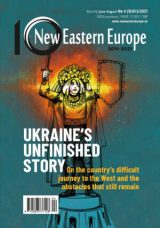
Dataism and its limits
Tangent
If, like Miriam Rasch, you want to resist seamless dataism and de-automate your life, why not take a look at her ‘Tangent’ on the subject. The following recommended reading from the Eurozine archive spans articles from the politics of digitization to poetry’s ability to creatively engage with fragmentation.





